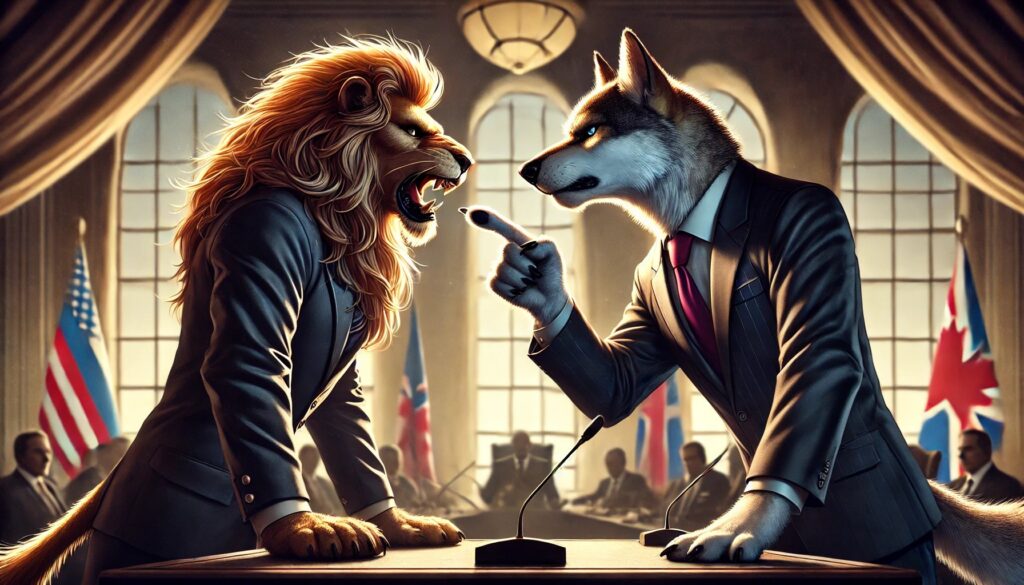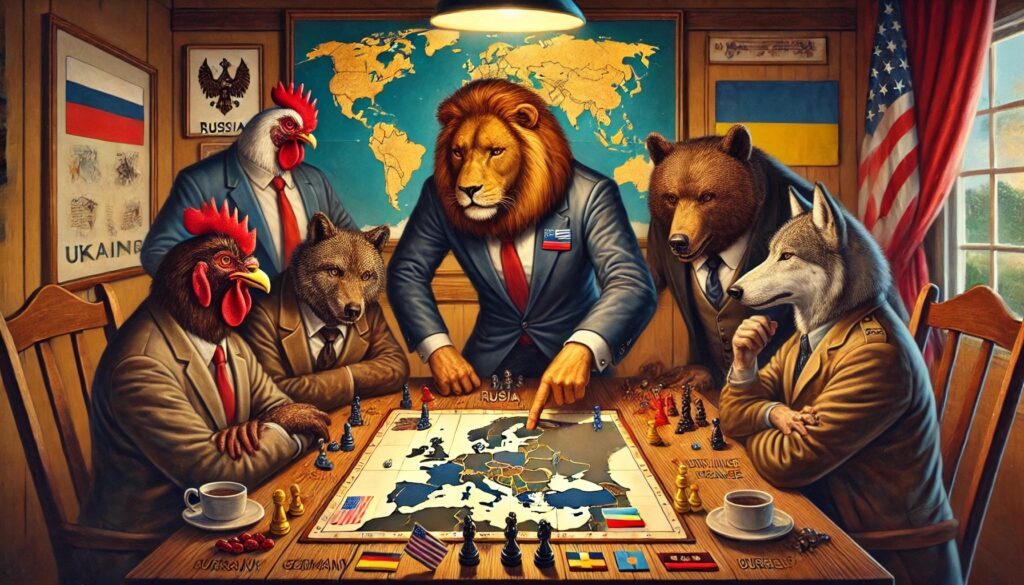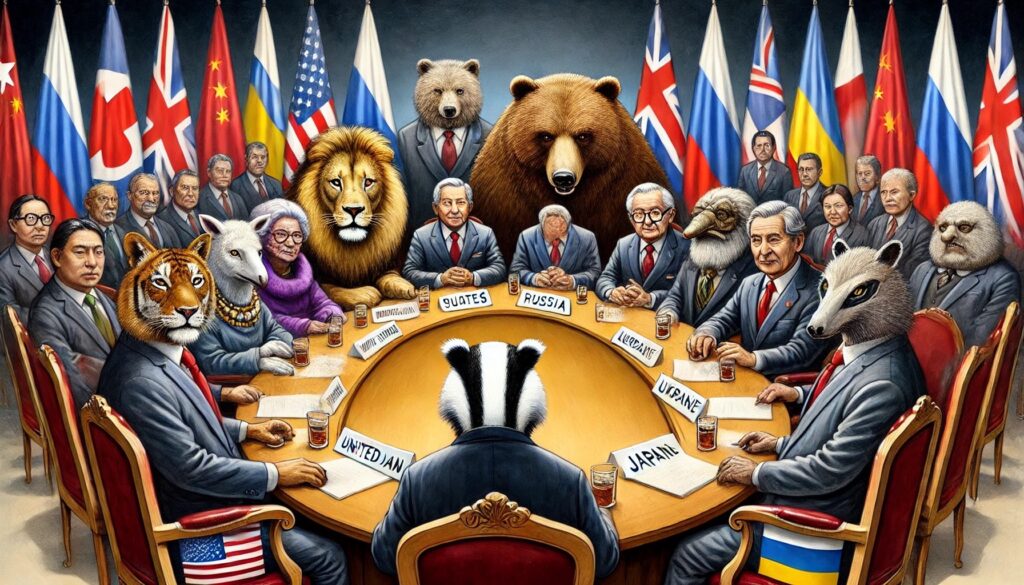The Ukraine war has been prolonged, and peace negotiations have proven to be extremely difficult. In this context, a meeting between President Trump and President Zelensky ended in failure, further escalating tensions between the two nations. This article examines the background and key issues of the meeting and explores the lessons Japan can learn from this situation.
Trump and Zelensky’s Failed Meeting
In January 2025, after being re-elected, President Trump held his first official meeting with President Zelensky. However, international relations surrounding the Ukraine war remain highly complex, and the breakdown of this meeting highlighted the challenges of peace negotiations. As a result, the joint press conference was canceled, and U.S.-Ukraine relations became even more strained.
Stalemate in the Ukraine War
The Ukraine war is currently in a state of stagnation. While Western nations are experiencing fatigue in their support, Russia is maintaining its military strength, anticipating a prolonged conflict. Ukraine faces significant logistical challenges in maintaining military supplies, making continued Western assistance indispensable for its war efforts.
Trump and the Oligarchs
An examination of Trump’s business history reveals connections to Russian oligarchs, including plans for Trump Tower in Moscow and hotel developments in Kyiv. Additionally, there were temporary real estate development projects in Ukraine. Given this background, Trump’s role as a mediator appears not merely as a political performance but as an action influenced by economic considerations.
Reconstruction Funds Instead of Reparations
Trump has suggested that the resource rights in Donetsk, Luhansk, and Zaporizhzhia could be utilized for Ukraine’s reconstruction. Additionally, a proposal exists where Russia would continue to pay transit fees for its natural gas and oil pipelines passing through Ukraine, with those fees being directed towards Ukraine’s rebuilding efforts. This approach could allow economic support without requiring direct reparations from Russia.
The NATO Membership Issue
One of the biggest post-war issues is defense. Ukraine has been seeking NATO membership, but this remains one of the core causes of the conflict, making it unlikely to be realized. However, Ukraine had previously given up its nuclear weapons in exchange for security guarantees from Western countries, leading to frustration over the current situation.
Japan Is Not an Outsider
From Japan’s perspective, the Ukraine war serves as a reminder that wars do not end easily once they begin, and reclaiming lost territory is extremely difficult. Japan must take diplomatic and defensive measures to prevent conflicts regarding the Senkaku Islands and potential crises in Taiwan.
Former Tokyo Governor Shintaro Ishihara
Regarding territorial issues, former Tokyo Governor Shintaro Ishihara emphasized the importance of strengthening actual control. Concrete measures, such as constructing lighthouses and surveillance facilities on the Senkaku Islands, are necessary. Diplomatic, economic, and military pressure should be utilized to engage in negotiations before crises escalate. Enhancing Japan’s defense capabilities, clarifying the role of the Self-Defense Forces, and discussing constitutional amendments are unavoidable challenges.
The Ukraine war serves as an important lesson for Japan. To maintain peace, preparations must be made to prevent conflicts, and the nation must take a firm stance in international affairs.
Trump and Zelensky’s Failed Meeting
On February 28, 2025, a meeting between U.S. President Donald Trump and Ukrainian President Volodymyr Zelensky at the White House collapsed. The primary agenda was peace negotiations, but stark differences in opinion prevented any agreement.
President Trump strongly urged Ukraine to engage in peace talks with Russia. However, President Zelensky rejected any compromise with President Putin, emphasizing Ukraine’s sovereignty and territorial integrity. European nations supported Ukraine, maintaining that there should be no concessions to Russia.
Key Disputes in the Meeting
During the meeting, heated discussions took place, and the signing of a planned mineral resources agreement did not materialize. As a result, U.S.-Ukraine relations have become further strained, potentially affecting the future course of the war and diplomatic negotiations.
During the talks, President Trump warned Zelensky, stating, “You should consider the risk of World War III,” and strongly urged him to participate in peace negotiations. However, Zelensky refused, insisting that Ukraine’s full independence and territorial restoration were the priority.
As a result of this confrontation, the joint press conference between the two leaders was canceled, and President Zelensky left the White House. Shortly afterward, President Trump posted on social media, criticizing Ukraine’s stance, stating, “President Zelensky is not ready to accept a U.S.-led peace initiative.”
In response, European leaders reaffirmed their support for Ukraine. EU High Representative for Foreign Affairs and Security Policy Josep Borrell stated, “Ukraine is part of Europe, and we will fight together,” while French President Emmanuel Macron declared, “The aggressor is Russia.”
The breakdown of this meeting could impact U.S. military aid and economic support for Ukraine, drawing global attention to the future of international relations and the war.
Current State of the Ukraine War
Ukraine continues its war efforts with military aid from Western nations, but the battlefield remains at a stalemate. Western fatigue over providing assistance is becoming evident, and within the U.S., criticism of Ukraine support is growing, particularly among Republicans. European nations, facing economic burdens, are also expressing concerns over sustaining aid.
Ukraine faces significant challenges in maintaining its military power and logistics. Ammunition and personnel losses from prolonged warfare are mounting, and without continued resupply, sustaining the fight will be difficult. As Ukraine is not a NATO member, it cannot expect direct military intervention from the alliance.
Meanwhile, Russia is preparing for a long-term conflict. Despite economic sanctions, it continues to maintain its military strength and shows no willingness to relinquish occupied territories.
In this context, Trump’s attempt to mediate peace negotiations has drawn significant attention.
Trump’s Mediation and Expected Negotiation Points
Trump has repeatedly claimed that he alone can bring Russia and Ukraine to a peace agreement, and this meeting was part of that effort. However, since Ukraine rejected the proposal, Trump’s mediation attempt remains in limbo.
Trump’s Business Ties with the Soviet Union, Russia, and Ukraine
Before his presidency, Trump had deep business connections with the Soviet Union, Russia, and Ukraine. In the 1980s, he explored hotel investments in the Soviet Union. In the 1990s, he pursued real estate projects in Moscow. Since the 2000s, he leveraged connections with Russian oligarchs to expand his business. In Ukraine, resort development plans were considered but never realized.
Trump has repeatedly made positive remarks about Putin, which could be seen as mere business flattery. However, his long-standing economic ties with Russia suggest a deeper motivation behind his foreign policy decisions regarding Russia and Ukraine.
Although Trump did not successfully invest directly in Russian real estate, he benefited from branding businesses that attracted Russian wealth. He also once planned large-scale projects in Ukraine. Reports indicate that individuals involved in his Moscow Trump Tower project also sought similar developments in Ukraine, highlighting his extensive business ties within the former Soviet bloc.
Potential Negotiation Cards
Trump might propose several negotiation strategies:
- Offering Ukraine a deal where it withdraws from Russian-controlled areas in exchange for Russia returning some occupied territories.
- Implementing compensation through “economic transactions” rather than direct reparations. For example, channeling Russian pipeline transit fees as “Ukraine reconstruction funds,” reducing Russia’s burden while financially supporting Ukraine.
- Utilizing revenue from rare earth minerals in occupied regions to fund Ukraine’s infrastructure rebuilding.
- Establishing a joint reconstruction initiative where Russia contributes to Ukraine’s recovery through economic collaboration rather than direct reparations.
Post-War Military Considerations
Ukraine will likely push for NATO membership, but this issue remains a core cause of the war and is unlikely to be realized. However, Ukraine previously surrendered its nuclear weapons in exchange for Western security guarantees, making the current situation deeply frustrating.
The Biden administration’s initial reluctance to provide robust military support extended the conflict. Realistically, Ukraine may never join NATO but could maintain Western military cooperation. For Russia, this arrangement might be seen as a security concession, but the conditions for this military cooperation will likely be a contentious issue equal to territorial disputes.
Is Japan Prepared? Preventative Measures Before War Begins
The Ukraine war serves as a significant lesson for Japan. Wars are not easily ended once started, and reclaiming lost territory is extremely difficult. The importance of maintaining “effective control” over disputed regions has become clearer.
Japan should strengthen its “effective control” over its territories. As former Tokyo Governor Shintaro Ishihara once suggested, constructing lighthouses and surveillance facilities on the Senkaku Islands could enhance deterrence. Additionally, advancing constitutional reforms to clarify the role of the Self-Defense Forces is crucial.
Strategies to Prevent War Before It Starts
Detecting early warning signs and taking preventive measures is vital. Before the Ukraine war, Russia’s large-scale military buildup was visible. Japan must implement defensive measures in response to potential crises involving Taiwan and the Senkaku Islands.
Moreover, Japan must demonstrate a “self-reliant defense” posture. While allied with the U.S., American military involvement is not guaranteed. Strengthening Japan’s defense capabilities and reducing reliance on foreign powers is essential.
Negotiation opportunities should not be missed. Using diplomatic, economic, and military leverage before a conflict erupts is critical. If President Biden had explicitly stated that the U.S. military would defend Ukraine, Russia might have been deterred from invading.
Conclusion: War Should Not Start—Preparation is Key
The Ukraine war has shown the world that once a war begins, ending it is extraordinarily difficult. Japan must reinforce its defense strategies, enhance control over disputed territories, and implement diplomatic crisis management. Rather than seeing Ukraine’s tragedy as someone else’s problem, Japan must proactively prepare for maintaining peace.
Once war erupts, civilians bear the greatest suffering. Protecting territory and strengthening governance is a fundamental national duty. The Japan Coast Guard and Self-Defense Forces are already safeguarding Japan’s maritime borders, and their efforts must be reinforced.
Additionally, accurate information about Japan’s security environment must be disseminated. The media has a significant role in ensuring public awareness of national security challenges. A well-informed citizenry capable of rationally assessing the situation is crucial for an effective national defense strategy.
Trump’s Case Reflects Japan’s Future
The heated exchanges between Trump and Zelensky demonstrated the challenges faced by wartime leaders. While leaders must show strength, their discussions must remain diplomatic and strategic, especially in front of media cameras.
If Japan were to face a similar crisis, would its leadership be prepared? For example, in the event of a Chinese invasion of the Senkaku Islands or a Russian incursion into Hokkaido, Japan’s response would be crucial. Poor handling could result in lost international support and a security crisis.
While Zelensky’s firm stance was understandable, strategic communication is essential. Preparation is key to ensuring Japan is not caught off guard in a similar crisis.








